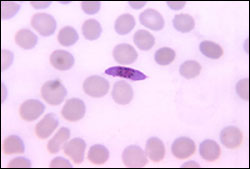Mosquitoes are more attracted to individuals infected with malaria

Mosquitoes are most attracted to children infected with malarial parasites in the gametocyte stage. The Anopheles mosquito ingests gametocytes during its blood meal. (CDC/ Dr. Mae Melvin)
Malaria remains a devastating problem in Africa and understanding the factors affecting its transmission remains a crucial part of the effort to combat the disease. A new study published in the premier open access journal PLoS Biology conducted in Western Kenya by Jacob Koella and colleagues now reveals that mosquitoes are more attracted to children with the infectious stages of malaria than to those infected with non-transmissible forms of the disease or to uninfected people.
The question of whether malaria increases your chances of being bitten by a mosquito has long stalled scientists because of numerous confounding factors. Sweat, breath odour, and high body temperature all increase mosquitoes¡¦ blood lust, and no previous study had been able to isolate the effect of just the parasite. To measure how attracted the mosquitoes were to the participants, the researchers set up a chamber of uninfected female mosquitoes surrounded by tents containing the children – one already infected with transmissible malaria, one infected with the non-transmissible asexual stage of the disease, and one with no infection. A device called an olfactometer wafted the odours of each participant towards the mosquitoes. Researchers measured which child most attracted the hungry bugs. Koella et al. found that individuals attracted significantly more mosquitoes if they had the infectious stage of the malaria parasite. Moreover, when the children were treated with antimalarial drugs, there was no difference in the subsequent attractiveness of the participants.
It is already known that mosquito biting rates greatly influence the spread of malaria. Now Koella and colleagues have shown that the parasite itself manipulates the biting behaviour of the mosquito vector when it is ready for a new host. Such manipulation could have a profound effect on the epidemiology of disease and, if it is not considered, could lead to severe biases in the estimates of the intensity of malaria transmission.
Media Contact
All latest news from the category: Health and Medicine
This subject area encompasses research and studies in the field of human medicine.
Among the wide-ranging list of topics covered here are anesthesiology, anatomy, surgery, human genetics, hygiene and environmental medicine, internal medicine, neurology, pharmacology, physiology, urology and dental medicine.
Newest articles

Sea slugs inspire highly stretchable biomedical sensor
USC Viterbi School of Engineering researcher Hangbo Zhao presents findings on highly stretchable and customizable microneedles for application in fields including neuroscience, tissue engineering, and wearable bioelectronics. The revolution in…

Twisting and binding matter waves with photons in a cavity
Precisely measuring the energy states of individual atoms has been a historical challenge for physicists due to atomic recoil. When an atom interacts with a photon, the atom “recoils” in…

Nanotubes, nanoparticles, and antibodies detect tiny amounts of fentanyl
New sensor is six orders of magnitude more sensitive than the next best thing. A research team at Pitt led by Alexander Star, a chemistry professor in the Kenneth P. Dietrich…





















